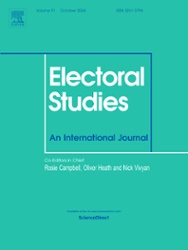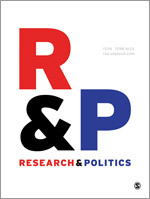Research
Publications
 | Targeting Voters Online: How Parties’ Campaigns Differ Cornelius Erfort Electoral Studies, 2024 Article Github |
Abstract: How do parties target campaign ads online? Despite the growing importance of digital campaigns, only a few recent studies have analyzed whom parties are targeting. Do parties aim to persuade or mobilize voters? This paper analyzes how parties target and how they differ in their use of targeting using a new and comprehensive dataset, matching data from the Facebook Ad Library with EES survey responses. The dataset contains over 100,000 Facebook and Instagram ads from 148 parties for the 2019 European Parliament elections. The results show that smaller and niche parties have targeting strategies more narrowly focused on their supporters, whereas larger parties target a broader audience. My findings have important implications for research on voter targeting and the ongoing debate about the regulation of campaigns online.
 | The PARTYPRESS Database Cornelius Erfort, Lukas F. Stoetzer, and Heike Klüver Research and Politics, 2023 Article Github Dataverse Hugging Face |
Abstract: We present the newly compiled PARTYPRESS Database which compiles more than 250,000 published press releases from 67 parties in nine European countries. The database covers the press releases of the most relevant political parties starting from 2010 onward. It provides a hand-labeled subset in 21 unique issue categories according to a general codebook. We discuss and evaluate different supervised machine learning approaches to obtain evolving issue agendas of the different parties. We extend a recent analysis in Gessler & Hunger (2022) to illustrate the usefulness of our approach in studying dynamic party competition, communication, and behavior.
Revise & Resubmit
1. Gendered targeting: Do parties tailor their campaign ads to women?
Journal of Politics (JOP)
Preprint
Abstract: Are parties communicating differently to women? A growing literature documents gender differences in the political behavior of both voters and politicians, and suggests that this can help or hurt parties electorally. We still know little, however, about whether and how parties adapt their campaign strategies and differentiate their communication accordingly. I analyze how parties strategically vary their communication in ads targeting women using a new comprehensive dataset of over 60,000 Facebook and Instagram ads from 146 parties during the 2019 European Parliament election. Large-scale computational vision identifies the tailoring of ads to female audiences in parties’ social media ads. The results show that parties not only strategically target women, but that they also tailor the content of ads to women. The findings are important because they uncover gendered strategies in parties’ campaign communication which have important implications for political representation and opinion formation.
Under Review
1. Buying Voter Support for Unpopular Policies: Evidence from German Nuclear Power Plants
with António Valentim, and Heike Klüver
Preprint
Abstract: How can governments ensure voters’ support for unpopular policies? Policymakers often have to implement policies that are unpopular in local communities, such as the construction of windmills or nuclear power plants. However, little is known about how policymakers can increase local support. We argue that perceived economic benefits increase support for otherwise unpopular policies. We test our argument by studying the consequences of nuclear power plants on support for the Green Party in Germany, a strong opponent of nuclear energy. We collected a novel dataset on the geographic location of nuclear plants and voting records since the 1980s. Using difference-in-differences and instrumental variable designs, we find that the opening of nuclear power plants has a negative effect on the vote share of the Greens. Additional individual-level panel analyses suggest that this effect is driven by economic considerations. Overall, these results are relevant for the study of energy transitions and the design of unpopular policies more generally.
Working Papers
1. Parties’ issue adaption between elections
with Lukas F. Stoetzer, and Heike Klüver
(presented EPSA 2023)
Preprint
Abstract: Are parties responsive to short-term changes in election polls? While party responsiveness to election results has received much attention, we know little about the dynamics of issue attention between elections. In this study, we address this question based on the novel comprehensive PARTYPRESS Database. We rely on supervised machine learning methods to build a dynamic measure of parties’ issue attention on the basis of more than 250,000 press releases from 68 parties across nine countries from 2010 until 2020. We find little support that losing in the polls leads parties to change their issue attention. When political parties lose support in the polls, they do not clearly prioritize their owned issue, they do not pay more attention to popular issues, and they do not adapt the issue focus of successful competitors. These findings have important implications for our understanding of party responsiveness and the dynamics of electoral competition.
2. Who Becomes a Lobbyist? Evidence from German Lobbyists’ Biographies
with Jan Stuckatz, Felix Hartmann, and Heike Klüver
Abstract: Who represents the diverse interests of interest groups in parliament? Lobbyists crucially inform the legislative process, yet our knowledge about who these lobbyists are is based almost exclusively on evidence from the US. However, we argue that incentives to become, but also recruit professional lobbyists importantly differ with the institutional context like the electoral system, transparency rules and decision-making competences. We therefore address this important gap by shedding light on the selection of lobbyists in Germany. We combine data from the newly established lobby register of the German Bundestag with comprehensive biographical data that we scraped from the LinkedIn pages of more than 7,000 registered lobbyists. We map typical career trajectories using sequence analyses to shed light on the characteristics of lobbyists. We furthermore investigate the role of networks, partisan affiliation and factual expertise. Our findings have important implications for our understanding of lobbying and political representation.
3. Measuring protest through news articles: A validation approach for manual and semi-supervised methods using government data
Preprint
Abstract: Protests are an important and well researched aspect of political behavior, making measurement validity crucial. But protests can be difficult to observe. Most studies use newspapers for event coding, introducing a selection bias. Validation usually involves comparing different newspapers or using independent sources. I benchmark a manually and a partly automatically coded dataset from the PolDem project against a large government dataset covering all extreme right demonstrations in Germany from 2005 to 2020. Coverage in newspapers mainly depends on region and size. Machine learning can provide a good estimate about the possible misdetection of events. The results have important implications for the study of protests. Researchers should carefully assess the advantages and shortfalls of media-based datasets.
